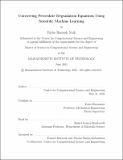Uncovering Perovskite Degradation Equations Using Scientific Machine Learning
Author(s)
Naik, Richa Ramesh
DownloadThesis PDF (8.519Mb)
Advisor
Buonassisi, Tonio
Terms of use
Metadata
Show full item recordAbstract
Many important materials are metastable or unstable under certain operating regimes. The degradation mechanisms can be varied and complex, making the discovery of underlying differential equations (DEs) through a first-principles approach challenging. This invites the application of data-science methods to infer root causes. Traditionally, machine learning (ML) applied to materials research has focused on optimization and regression over a limited training set. Inferring physical laws directly from data may allow the extraction of more generalizable scientific information that enables one to understand underlying mechanisms. In this study, we apply scientific ML — a blend of traditional scientific mechanistic modeling (differential equations) with machine learning methodologies — to identify differential equations governing the degradation of methylammonium lead iodide perovskite (MAPI), a material with known instability under environmental stress. We explore scientific ML applied to simulated and experimental datasets, obtaining equations that describe the temperature- and time-dependencies of MAPI degradation. Our method of choice is sparse regression method PDE-FIND (Rudy, Samuel H., et al. "Data-driven discovery of partial differential equations." Science Advances 3.4 (2017): e1602614). We find that the underlying DE governing MAPI degradation corresponds to the Verhulst logistic function, often used to describe autocatalytic or self-propagating kinetics. This thesis demonstrates the application of scientific ML in practical materials science systems, highlighting the promise and challenges associated with ML-aided scientific discovery.
Date issued
2021-06Department
Massachusetts Institute of Technology. Center for Computational Science and EngineeringPublisher
Massachusetts Institute of Technology